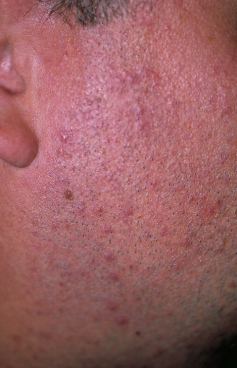Can you identify this acneiform eruption?
Dermclinic
A Photo Quiz to Hone Dermatologic Skills

Case 3:
Fifteen years after his last outbreak of acne, a 38-year-old man notices an acne-like eruption on his face. The asymptomatic rash appeared 3 days earlier. Last month, the patient had poison ivy dermatitis, which was treated with 2 courses of prednisone. He takes no other medications.
What disorder do you suspect?
A. Acne vulgaris.
B. Rosacea.
C. Staphylococcal folliculitis.
D. Pityrosporum folliculitis.
E. Prednisone-induced acne.
(Answer on next page.)
Dermclinic—Answer
 Case 3: Steroid-induced acne
Case 3: Steroid-induced acne
Steroid-induced acne, E, which occurs 2 to 5 weeks after the drug has been used, is thought to be caused by follicular collapse of the walls of the sebaceous follicle. This patient’s sterile pustules resolved over a few weeks; a keratolytic agent, such as tretinoin, can hasten resolution.
Staphylococcal folliculitis occurs abruptly, but it is generally very painful. Pityrosporum folliculitis does not usually present suddenly or on the face. Bacterial and fungal cultures ruled out infection; therefore, systemic or topical antibiotics were not warranted. It would be unusual for rosacea or acne to appear in an adult without a precipitating factor, such as corticosteroid use. ■


